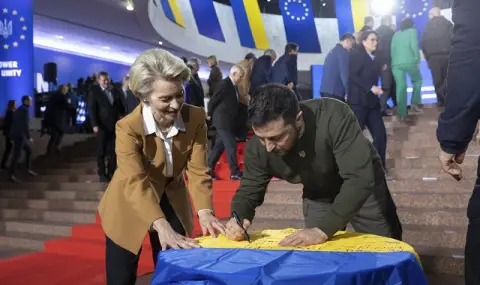Historic day : no matter how long the accession negotiations with Ukraine and Moldova continue, the EU is de facto entering the territory of the post-Soviet space. In this sense, this is the day when the USSR will finally die.
Vilnius, the evening of November 29, 2013. Demonstrators, mostly young people, chant: "Yanukovych, sign!". They have formed a "living corridor" from the exit of the "Kempinski" hotel to the entrance of the Palace of the Grand Dukes of Lithuania, which is hosting the EU Eastern Partnership summit on that day.
The dream came true
The people who arrived from Ukraine called on their then president, Viktor Yanukovych, to sign the association agreement with the EU, which Moscow opposed in every way. Yanukovych did not sign the document. Demonstrations in Kyiv followed, a brutal police attack on a makeshift student protest camp, and then the Maidan protests, Yanukovych's flight from the country, the annexation of Crimea, military action in the Donbass, and Russia's full-scale invasion of Ukraine.
11 years later, the dream of the demonstrators from Vilnius did not just come true - on that November evening, they could not even dream that on June 25, 2024, Ukraine, together with Moldova, would start negotiations not for partnership, but for accession to the EU.
Negotiations may last years and even decades, given the state of the economies and state structures, corruption and the need to bring the legislation of both countries into line with EU standards. But the political symbolism of the beginning of the dialogue with Kyiv and Chisinau is difficult to overestimate. Despite Putin's aggression against one side and the presence of Russian troops and a separatist entity in the other, the EU is telling the Ukrainians and the Moldovans: "You deserve to be with us and you will be with us.
If we recall the recent recognition of Georgia's status as a candidate for EU membership, we can say that the Community has made a principled decision to issue a political challenge to Putin. Also symbolically, only a day earlier, Brussels launched a new package of sanctions against Russia.
To some extent, this is even more dramatic for Russia than the 2004 accession of the Baltic countries to the EU (and NATO). Their occupation by Stalin's USSR has never been questioned. And despite Moscow's displeasure, the accession negotiations and the decision to admit the Baltic states came at a time when relations between the EU and Russia were flourishing and no one could have imagined the emergence of a regime like the current one.
Putin's Tools: Blackmail and Propaganda
The Russian leadership will try to respond to the new challenge from the EU. But how? It has been tormenting Ukraine for years and will continue to do so as brutally as possible. In the new conditions, it is possible that the Kremlin will put pressure on the authorities of the so-called "Transnistrian Moldavian Republic" and to request its inclusion in the composition of Russia, allegedly based on the desire of the inhabitants of Transnistria themselves. Moreover, over 200,000 Russian passport holders live in this region.
But here comes a problem. First, the Kremlin cannot effectively control the territory of Transnistria due to its geographical location. The Russian garrison there is small, and while Moldova has no forces for war, its leadership can turn to the government of neighboring Romania, a NATO member, for help. About 1 million people with Romanian citizenship live in Moldova. Bucharest would have strong reasons to support Chisinau and assist in the organization of an effective blockade of Transnistria.
Secondly, and perhaps even more important, there may not be enough people in Tiraspol ready to take this step. Since Transnistria is part of the territory of Moldova, local businesses benefit from the advantages of association with the EU, including the establishment of companies on the territory of the Community. Many would not want to lose this.
In Gagauzia, another of the Moldovan regions, separatist sentiment is also strong, but local separatists supported by Moscow would not succeed in securing sovereignty - again for geographical reasons.
What to expect
What can certainly be expected from the Kremlin is the largest possible and long-lasting propaganda campaign in the EU itself, aimed at discrediting the idea of the EU membership of Ukraine, Moldova and Georgia. For this purpose, the Kremlin will use its allies among the more radical parties and politicians - both left and right.
However, everyone is aware that the path of both countries to the EU will be long. This topic, unlike, for example, migration from the Middle East and Africa, is not so relevant to EU citizens as to ignite such heated debates as to have a real impact on policy.
So June 25 will become a historic day. However long the negotiations with Ukraine and Moldova continue, the EU will take a decisive (and decisive) step towards entering the post-Soviet space. In a sense, on this day the Soviet Union will finally die.
